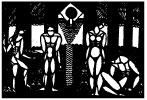| |
The second bill of the 1919-20 season opened on December 5, 1919 with the play Brothers by Lewis Beach, whose play The Clod had been a great success for the Washington Square Players in 1916. The playwright, whose full name was Emmet Lewis Beach, was from Saginaw, Michigan, and had been a member of George Pierce Baker’s Workshop 47 at Harvard. The Clod had been originally produced at Harvard in March 1914 and a second Beach play, Return of the Prodigal, was performed in the 1915-1916 Winter season there. The Clod isthe story of an old woman’s efforts to defend her home against both Union and Confederate soldiers in the Civil War and theatre critic Walter Prichard Eaton called it the best one-act play he had ever seen. The play gave the Washington Square Players their first big hit and a run of ten weeks, plus the group revived it in their summer season. Wank said the play gave a demonstration of “the dehumanizing effects of extreme poverty”; in some senses, Brothers does the same. Sub-titled “A Sardonic Comedy,” Brothers isa three-character play, though only the voice of the dying father is heard from the other room. The play tells the story of two brothers who have been set against each other by their father to spar their whole lives and are now interested to see who he has left his property to as he lay dying in the other room. Set in Michigan in the father’s “tarpaper shanty,” we hear that both brothers are extremely poor but far from motivated to change their circumstances, and they each try to convince the other that they are the more deserving of their father’s other shack and two acres of land. They also know about the others’ sins, which they remind the other they could testify about if called on. When they hear their father’s last cry in the other room, leading to a race to grab the key to the tin and read the will, only to find out he’d left everything to their mother, even though they’d divorced twenty years before. The play ends with the two deciding to burn down their father’s place rather than allow their mother to receive it over them.
James Light both directed and played Lon with a newcomer to the company, Jasper Deeter, playing Seth. Ward Roege played the voice of the father from offstage. Deeter later told Sarlos that he remembered Light allowed him to “develop his own characterization.”(1) Deeter was part of the new breed in the company who was looking to have a life career in the theatre. He was from Mechanicsburg, Pennsylvania, originally, the grandson of an auto parts magnate, and he had something of a rough start in a family of overachievers when he was expelled from Dickinson College. Seeing James O’Neill in The Count of Monte Cristo at a young agemade a deep impression on him that eventually led him to pursue acting in 1914. Also, Deeter’s sister, Jane, had met Eugene O’Neill in 1913 when he was living with the Rippins in New London and, after marrying James Rippen, Jr., was brought to their home during their honeymoon and listened to O’Neill read his early plays. Ironically, Deeter was now in the theatre company that gave O’Neill his start. After working for and then leaving a repertory company, he landed a part at the Greenwich Village Theatre in Shakuntala in April 1919 and became familiar with the Players. Eventually, Light asked him to act with the company for this production. The set for Brothers was designed by painter George Theodore Hartmann. The play was negligible enough that no critic even mentions it in their review of the bill.
© Jeff Kennedy, 2007.
(1)
Sarlos, Provincetown 292.
|
